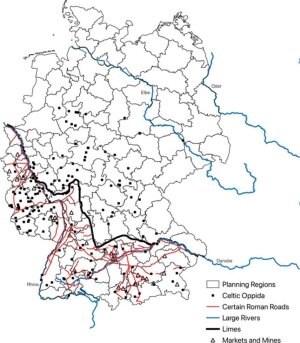
- Research
Published:
The Limes Germanicus (Upper-Germanic and Rhaetian Limes) is the solid black line. Blue solid lines are major rivers (Danube, Elbe, Oder and Rhine). Red solid lines are certain, major Roman roads. Black rectangulars are Celtic Oppida. And diamonds indicate the location of a Roman market or mine. The borders are planning region borders in present-day Germany.
Picture: ForschungsteamIn Germany, there were different socialisations and sensitivities on both sides of the Berlin Wall and the inner-German border, which continue to have an impact to this day. A recent international study involving scientists from the University of Jena now shows how strongly even a spatial separation that dates back almost two thousand years can shape psychology in the present day: The Limes forms another "psychological border" that divides Germany. According to study results, the area south of the Roman border wall shows higher values in life satisfaction, life expectancy and associated personality traits (Big Five) than the northern area. Surprisingly clearly, a border along the former Limes can be seen in today's psychological maps of Germany.
Making psychological heritage visible
"While economic research has long investigated how the Romans had long-term effects on local economic power, our study is new in that it now extends this analysis to psychological maps. The study suggests how historical events thousands of years in the past can have long-lasting 'hidden' psychological effects on contemporary populations," says lead researcher Martin Obschonka, who is now a professor at the University of Amsterdam after moving from Jena. "We see this as a long-term psychological effect of the Roman legacy in Germany - just as archaeologists excavate Roman ruins, we suspect that we are making a psychological legacy visible in people's minds," adds senior professor Michael Fritsch from the University of Jena. "A stable factor that contributes to the declaration of these differences is the regional variation of personality traits such as extraversion, neuroticism or conscientiousness - which are associated with psychological well-being and health behaviour," explains Professor Michael Wyrwich (Jena and Groningen). The researchers have identified regional clusters of such personality traits below the Limes that are associated with better health and higher well-being and thus contribute to the maintenance of regional differences in these subject areas.
Psychological data from more than 70,000 respondents analysed
In the current study, those present-day German regions that were part of the Roman Empire almost two thousand years ago and were therefore deeply influenced by Roman culture and civilisation were compared with those German regions that remained outside the Roman sphere of influence. The researchers used modern statistical methods and psychological data from surveys with a total of more than 70,000 respondents. The results of the study confirm that the Roman occupation has left a lasting psychological legacy: People living in the former Roman territories today report higher levels of life satisfaction and better health, and also have a higher life expectancy.
"Even after accounting for more recent historical factors and a variety of specific regional conditions - including Geology, climate and economic development - we found a clear link between the local Roman imprint and a present-day psychological profile in these once Roman regions characterised by higher well-being: both in personality traits, such as higher conscientiousness and extraversion and lower neuroticism, and in greater life satisfaction and longer life expectancy," says Martin Obschonka. These regional patterns were further confirmed by a special statistical method analysing the border regions along the Limes.
Mechanisms of the Roman long-term effect
"The study suggests that Roman local investment in economic advances such as the road network, markets and mines contributed decisively to this effect. The Limes Wall therefore marked the boundary between one of the most advanced and influential civilisations in History and the comparatively underdeveloped Germanic tribes," explains Michael Fritsch. There are numerous examples that show how deeply and permanently not only the Roman road network and the associated trade with the entire Roman Empire, but also the very advanced Roman culture of the time, which placed great value on well-being and health, had a lasting impact on the local areas. "The Roman occupation left behind a significant and lasting economic and cultural legacy, which - we assume - is now also reflected in the psychological maps".
The fact that this effect lasted so long can be explained by the human ability to build on cultural advances over generations and pass on regional culture. "We also know from economic research that local economic advantages - which themselves may have their roots in History - manifest themselves as persistent advantages over long periods of time," says Michael Wyrwich.
Results are transferable to Limes regions in the Netherlands
The study also examined whether a psychological boundary is evident along the Limes not only in Germany, but also in the Netherlands. "We were also able to show this Limes effect in the Netherlands. Together with the findings from Germany, this shows that History shapes us in a way that we often overlook," says Martin Obschonka. "The psychological boundaries we notice today may have their roots deep in the past. Ancient borders, made of wood or stone like the Limes, may have long since disappeared, but their psychological impact can persist for millennia - invisible but still significant, as a psychological boundary."
Researchers from the Universities of Amsterdam, Cambridge, Groningen, Jena, Texas and the Vienna University of Economics and Business were involved in the new study.
Original publication:
Martin Obschonka, Fabian Wahl, Michael Fritsch, Michael Wyrwich, P. Jason Rentfrow, Jeff Potter, Samuel D. Gosling: Roma Eterna? Roman Rule Explains Regional Well-Being Divides in GermanyExternal link. Current Research in Ecological and Social Psychology. DOI: 10.1016/j.cresp.2025.100214
07743 Jena Google Maps site planExternal link
